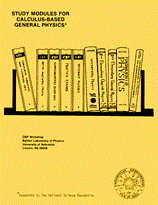Instructional Materials in Physics and Astronomy

Calculus-Based General Physics
Date of this Version
1975
Document Type
Article
Abstract
Too bad! In case you have not realized it, not all charges come packaged as points, spheres, infinite cylinders, or infinite planes. Ah, if only it were so: Life would be much easier from a calculational viewpoint, although somewhat limited in geometrical options. But then, mechanics would be simpler if only constant accelerations were observed in nature ... Not to mention centers of mass; moments of inertia, etc.; all would be considerably simpler to calculate in that wonderful world of point masses, constant accelerations, massless strings, and frictionless boards.
Once again calculus is needed to assist us in analyzing and understanding natural phenomena that are often manifested in hunks of mass, variable accelerations, and globs of charge.
This module introduces no new fundamental physics. Instead, you will learn to extend the concepts of electric field and potential to charge distributions that defy solution by superposition of point-charge fields and potentials or application of Gauss' law.


Comments
From Study Modules for Calculus-Based General Physics
Copyright © 1975 CBP Workshop, University of Nebraska–Lincoln.
Reproduction rights granted.